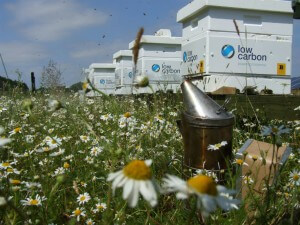 Leading renewable energy investment company Low Carbon has launched an initiative to promote greater biodiversity in Cornwall, Dorset and Suffolk. Low Carbon has partnered with sustainability company
Leading renewable energy investment company Low Carbon has launched an initiative to promote greater biodiversity in Cornwall, Dorset and Suffolk. Low Carbon has partnered with sustainability company
Plan Bee to install and manage 25 bee hives across five of its solar farms.
Honeybee populations have halved in the UK over the last two decades, according to research by the University of Reading, with climate change, mites, pesticides and disorders, contributing to this. Plan Bee partners with businesses like Low Carbon to support and increase populations of this valuable insect, which is an essential component in the balance of our
delicate ecosystem.
Quentin Scott, Low Carbon’s Marketing Director said:
“We are committed to protecting local habitats and ecosystems on our solar farms. Encouraging biodiversity should not be a bolt on for renewable energy companies, but rather a core responsibility. Protecting bees, insects and other species is a crucial part in the fight against climate change and we look forward to continuing our work with Plan Bee in the future.”
Low Carbon works across the solar, concentrated solar power, wind and anaerobic digestion sectors. It currently operates over 270MW of operational solar energy assets in the UK.
The renewable energy investor is making every effort to play a central part in the farming communities surrounding its sites. By locating on fallow land that is unusable for agriculture, Low Carbon is delivering a long-term investment in these areas.
Quentin added:
“By taking measurable steps to install beehives on our solar farms, we hope to show that investing in solar PV on their land needn’t be at the cost of local wildlife. Through our community outreach, we want to help champion biodiversity”
Each of the five sites will host more than 300,000 bees to help cultivate local crops and encourage biodiversity. A remote monitoring system is planned, which will allow Plan Bee to keep tabs on each bee colony by monitoring parameters such as brood temperature, humidity, hive weight and weather conditions.